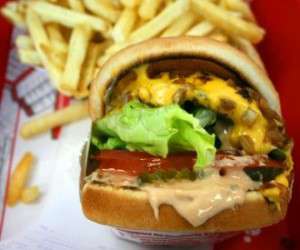Well, whatever the reason behind your interest in food storage, make sure to follow these four basic principles for storing food short-term & long-term: S.A.V.E.
- Store foods that you like & eat regularly.
- Add fresh fruits, vegetables, meats, if possible.
- Variety of food choices within your storage enhances the experience of using it.
- Educate & Evaluate the specific needs you/your family has in terms of nutritional intake needs (calories, carbs, vitamins, essential fats/oils, sugars, etc.), potential dietary restrictions/allergies/intolerances, preferences, and other factors unique to your situation.
#1 Store foods that you like & Eat regularly.

In-N-Out Double Double Animal Style
I wonder if an In-N-Out Double Double could be dehydrated or freeze-dried for long term storage? But seriously, so many families bulk up on wheat, beans, rice, and oatmeal, thinking that they will magically concoct recipes without having previously practiced and perfected cooking from scratch! Do not make this mistake. You should only store those foods that you will enjoy eating and that you are familiar with before having to consume them. This point dove-tails with #3, but onto point #2.
#2 Add fresh fruits, vegetables, meats, if possible.
Another mistake many make is to plan using their dehydrated/freeze-dried food as their primary source of the body's energy & nutrients. Although high-quality food storage will possess properties of nutrition and taste good, it is crucial that fresh fruits & vegetables be available if at all possible. Fruit & vegetables that have been canned at home or preserved properly can be included in this point. This suggests that possessing gardening/canning skills will benefit all whose friend the gardener/canning expert is. Fresh meat will obviously have to be obtained from hunting…another skill that is not so easy as to “shoot, clean, & cook.”
#3 Variety of food choices…enhances the experience…
There is something to be said about the need for variety, especially if you have a finicky spouse, teenagers, or young children…or if you're the picky eater! Besides the fact that a variety of foods ensures solid nutritional content, the psychology of a situation where food storage is required can involve mental/emotional stressors that will impact the situation in a tangible way. Also, morale improves when “the same old thing” doesn't have to be eaten with reluctance and resentment. Because the eating of good food can prove an enjoyable experience to the senses & sociality, the converse is also true: “bad meals” can make people upset, create a psychological barrier to consciously maintaining health, and create unnecessary waste of precious resources.

The best plans are those which are properly made before-hand.
#4 Educate & Evaluate the specific needs you/your family has…
Continually striving to educate yourself & evaluate the specific needs for your particular situation, ensures a personalized plan that will enhance the health and well-being of your family. It is very important to be fully aware of any food allergies or intolerances an individual(s) may have before preparing food supplies. An individual with allergies to honey might benefit from using Stevia as a sweetener or brown sugar. Perhaps this same individual demonstrates no allergy to baked bread that used honey as an ingredient prior to being baked. The key here is being informed and taking a proactive role in educating and evaluating the specific needs of your situation.







No comments yet.